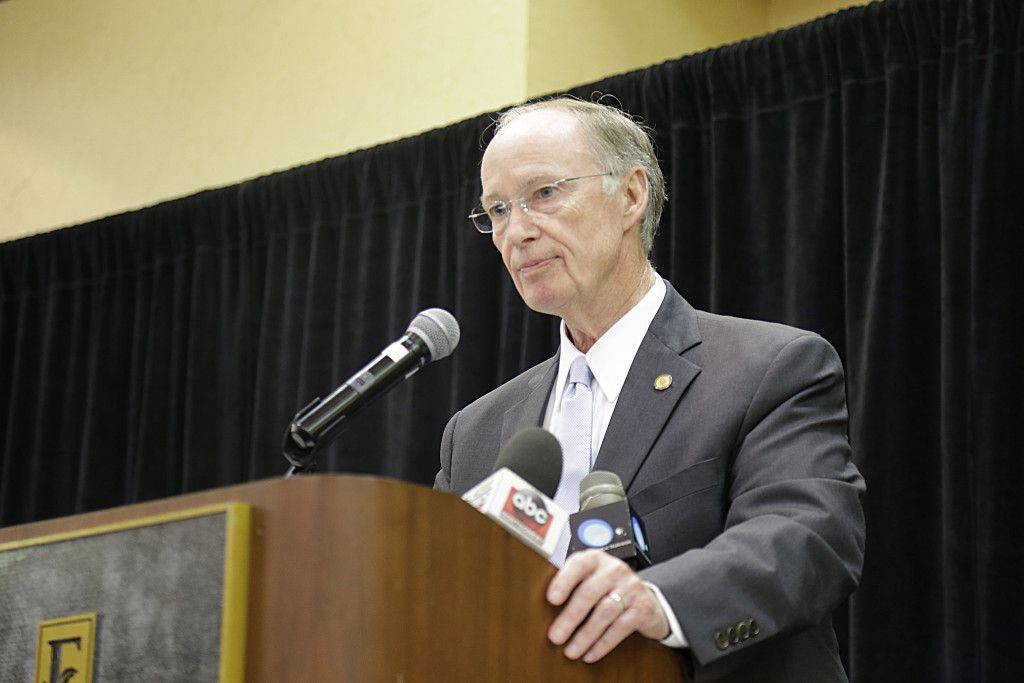Proposal circulating in Montgomery would close state primary elections

While Alabamians have already voted in the this year’s Presidential Preference Primaries, that hasn’t ended the conversation in 2016 about the state’s elections. A plan circulating in the Legislature would make Alabama one of 31 states who allow only registered Republicans and Democrats to vote in their respective primaries. SB 360 by Sen. Tom Whatley would close Alabama primaries; mandate a voter be registered with their party at least 14 days before voting in a primary; and prevent voters from switching parties in between a primary and primary run-off. Currently Alabama – like Deep South neighbors Tennessee, Georgia, and Mississippi – has open primaries. Some observers have said open primaries leading to voters casting “strategic” ballots, seeking to influence the outcome of a party they do not identify with. Alabama gave 44 of its 55 Democratic delegates to former Secretary of State Hillary Clinton while Vermont Sen. Bernie Sanders received nine during March 1 elections, as part of the newly-established “SEC Primary,” which saw Donald Trump took the lion’s share of Republican delegates, winning 36 out of 50. Texas Sen. Ted Cruz was awarded 13 delegates while Florida Sen. Marco Rubio managed to snag one. Trump and Sanders have both done better in open-primary states than those with traditional closed primaries and caucuses. SB 360 is co-sponsored by Sen. Cam Ward and Sen. Trip Pittman. Anonymous sources told Alabama Today on Thursday there is “much GOP support for this proposed legislation.”
Nanny State of the Week: FDA goes beyond the pale, prepares to ban teen tanning

In many states, teens are required to get parental permission before they can climb inside an indoor tanning bed. Soon, even parental permission might not be enough. The federal government is poised to let nannyism override parental consent. The Food and Drug Administration recently unveiled new rules for indoor tanning that would ban anyone under the age of 18 from using a tanning bed. The FDA says the new rules are part of a commitment to “protecting public health by informing consumers about the risks of indoor tanning.” CATCH SOME RAYS: Experts say “sun exposure is beneficial in moderation, but can be harmful in excess.” But when the government acts, its policies leave no room for moderation. Someone needs to get the bureaucrats at the FDA a dictionary, because they’re using the word “informing” incorrectly. “Informing consumers” means giving them information – like explaining how science shows a connection between excessive indoor tanning and higher risks of skin cancer – but then trusting informed consumers to consider that risk and make their own decisions. It could also mean taking steps to ensure that some people, like teens, are fully aware of the risks by getting their parents involved. Telling someone they are not allowed to do something is not “informing” them of anything, except perhaps the extent to which the federal government wants to stick its nose into their everyday lives. “These proposed rules are meant to help adults make their decisions based on truthful information and to ensure manufacturers and tanning facilities take additional steps to improve the safety of these devices,” says the FDA. But those same adults are apparently incapable of making that same decision when their children are involved. That’s the government’s job, apparently. Tanning is big business in the United States, and young people make up a substantial portion of tanning salons’ customers. About 20 percent of adults in the U.S. tan at least once a year, but as much as 35 percent of American teens do, according to data from the National Institutes of Health. Should parents be aware of the potential dangers of indoor tanning before letting their children tan? Absolutely. But should government have the power to overrule parents on the issue of tanning (or plenty of other issues, come to think of it)? Nope. Let’s not pretend there aren’t risks that come with tanning – whether done artificially or outside under the blazing sun the way God intended. According to the American Academy of Dermatology, those who have been exposed to radiation from indoor tanning are 59 percent more likely to develop melanoma than those who have never tanned indoors. But there are benefits, too, beyond the vanity of not looking like a ghost for six months of the year. Tanning helps eliminate acne, and getting a base tan before hitting the beach can help protect against serious sunburn. The federal government knows this. It funded research by the National Institutes of Health that found both risks and rewards to indoor tanning. “Sun exposure is beneficial in moderation, but can be harmful in excess. Sun exposure guidance should be tailored to the individual patient,” researchers for the NIH concluded. Government policies leave no room for moderation, or for individuals to tailor their actions to their own individual needs. When the government nannies decide to make something mandatory or illegal, there is no middle ground. The FDA is accepting public comment on the new rules until the end of March. Comments can be submitted here. • • • This article originally appeared at Watchdog.org. Eric Boehm is the national regulatory reporter for Watchdog.org. He lives in St. Paul, Minnesota.
Right-to-work amendment passed in Alabama Senate

The Alabama Senate has passed legislation reiterating Alabama’s position as a so-called “right-to-work” state. Senators on Thursday passed the amendment 25 votes to 9. Alabama voters will now have the chance to approve the amendment at the ballot box. Right-to-work states prohibit companies from requiring workers to pay union dues as a condition of employment. Alabama law already has the prohibition, but Republicans said adding the amendment to the state Constitution will give businesses additional assurances. In a debate on the Senate floor, Minority Leader Quinton Ross, a Democrat, called the amendment “asinine” and a waste of time and money. Ross says lawmakers have more important issues they should address. Republished with permission of the Associated Press.
State settles claim involving disabled inmates

Alabama has agreed to change how inmates with disabilities are treated and housed to settle part of a broader lawsuit over prison medical care. U.S. District Judge Myron H. Thompson will hold a Thursday hearing on the proposed settlement filed this week in federal court in Montgomery. In the proposed settlement, the state agreed to make sure inmate housing is compliant with the Americans with Disabilities Act and inmates can access programs and facilities. “This agreement is an important commitment by the Alabama Department of Corrections to address the discrimination and hardship these prisoners have faced for far too long,” said Maria Morris, a Southern Poverty Law Center attorney representing inmates. The lawsuit contended disabled inmates were kept in facilities that couldn’t safely accommodate them and were inappropriately housed with higher security inmates for no reason other than their disabilities. It also claims they didn’t have access to programs and devices, including functioning wheelchairs. During a fire, a wheelchair-using prisoner had to maneuver deeper into the prison to access a ramp to the outside, according to the lawsuit. The settlement agreement noted Alabama Gov. Robert Bentley‘s proposal to build four new prisons to replace existing facilities but said that monitoring of settlement compliance will continue regardless of whether the state builds new prisons. The Alabama Senate could vote on the proposed $800 million bond issue next week. “The Alabama Department of Corrections agrees that the filed settlement charts a sensible and prudent path to addressing ADA compliance issues caused largely by antiquated correctional facilities,” Corrections Commissioner Jeff Dunn said in a statement. “A proposal that is currently before the Alabama Legislature to transform the state’s prison system will allow for the construction of four new state-of-the-art facilities that will comply fully with ADA standards, and will go a long way in helping the department meet the terms of the settlement.” A group of inmates filed a civil lawsuit in 2014 that accused the state of failing to provide basic medical and mental health care to inmates. The remaining claims could go to trial later this year. “While we are pleased to have resolved these claims on behalf of prisoners with disabilities, this case is far from over,” said Lisa Graybill, deputy legal director of the Southern Poverty Law Center. Dunn said the department believes the remaining claims are without merit. “While the settlement only addresses ADA issues, the department believes it is providing constitutionally adequate medical and mental healthcare and services to offenders incarcerated in Alabama prisons,” Dunn said. Republished with permission of The Associated Press.
Robert Bentley reacts to prison reform bill’s Senate progress

Gov. Robert Bentley and the GOP-led Legislature in Montgomery haven’t been known for getting along – some expect this year’s Legislative Session to possibly hit another snag over the budget yet again. But Bentley did come out Wednesday with a bouquet of rhetorical flowers for Alabama lawmakers when it comes to the prison reform act currently circulating in the statehouse. The bill — approved by the Senate Finance and Taxation General Fund Committee this week — would attempt to overhaul the state’s notoriously ailing prison system by providing an $800 million revenue bond for the demolition of 14 of Alabama’s 16 prisons and subsequent renovation of the remaining two. The bill further provides for the construction of four new prisons, three male and one female, which will pay off the bond through perceived savings. “For decades, Alabama’s prisons have become increasingly overcrowded, dangerous to both inmates and our corrections officers and incredibly costly to taxpayers. I commend the Senate committee for passing the long needed Prison Transformation Initiative Act out of committee today,” said Bentley in a statement. “This bill will allow Alabama to take the next step toward constructing four new prisons, which will provide safer conditions for our corrections officers as well as inmates in facilities such as Tutwiler Prison for Women. Alabama can and should be a national leader in safe and effective incarceration of inmates. I look forward to continuing a partnership with the members of the Legislature to make Alabama a truly great state,” Bentley concluded. The bill was OK’d by the finance panel with just one dissenting ‘No’ vote, cast by Huntsville Republican Sen. Paul Sanford.
Four members of Robert Bentley staff get $73,000 raises despite lawmaker disapproval

Some legislators are criticizing Gov. Robert Bentley for raising salaries of his Cabinet members and staff, some by double-digit percentage increases. The sponsor of 2015 legislation that allowed the raises by abolishing old Cabinet salary caps called the size of the raises “indefensible” and said they were not what lawmakers had in mind when they approved the bill. “It’s outrageous,” Sen. Arthur Orr, R-Decatur, said in an interview Although many Cabinet members are making more money this year, four received raises of about $70,000, according to state pay records. The salaries of Alabama Department of Economic and Community Affairs Director Jim Byard, Alcoholic Beverage Control Board Administrator Mac Gipson, Revenue Commissioner Julie Magee and Insurance Commissioner Jim Ridling increased from $91,014 to about $164,000. The pay increases were first reported Monday by the blog Inside Alabama Politics. The law abolished old salary caps — largely considered outdated— and said Cabinet salaries should fall under a pay scale established by the Alabama Department of Personnel. The pay scale was created in August. Bentley, in a statement, said he would make “no apology” for the raises, saying they will help recruit and retain highly qualified people to run vital agencies. “This legislation was long overdue, and allows state government to be competitive with the private sector in getting highly qualified people to run important state agencies that provide vital services to our citizens. I make no apology for the salary increase for my Cabinet and staff. I appreciate their outstanding service to the people of our state,” Bentley said. Orr said lawmakers envisioned incremental increases at the lower end of the newly created pay scale. “It’s outrageous how high and how out of kilter we are now,” Orr said. For years it was not uncommon for governors to use personnel gymnastics to get around the salary cap for people who would supervise the largest state agencies. The acting director of transportation, for example, had been paid through the Alabama Law Enforcement Agency payroll. Republished with permission of The Associated Press

